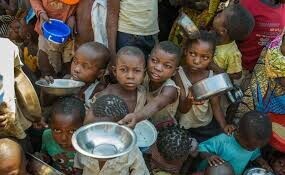The World Bank’s assessment of poverty levels in Nigeria has sparked significant outrage, prompting various interest groups to call for immediate action to prevent a potential economic collapse driven by poverty. During the recent Spring meetings for 2025 held in Washington, D.C., the International Monetary Fund and the World Bank presented a bleak outlook for Nigeria’s economy over the short to medium term.
Key points included a revision of the country’s economic growth forecast, suggesting that current economic policy reforms are largely failing to promote inclusive growth. The institutions concluded with a stark acknowledgment of the high poverty rate in the nation.
In an interview with the World Bank/IMF meetings, economic analysts and representatives from Civil Society Organizations (CSOs) expressed their dismay over Nigeria’s standing in the discussions.They identified several key challenges and put forward recommendations aimed at rescuing the economy from the impending threats highlighted by the global institutions.
Additionally, in response to the World Bank’s assessment of Nigeria’s economy, Dele Oye, President of the Nigerian Association of Chambers of Commerce, Industry, Mines, and Agriculture (NACCIMA), suggested several short-term measures that could help protect the country’s vulnerable populations and advance efforts in the battle against poverty.
ActionAid Nigeria’s Country Director, Andrew Mamedu, expressed deep concern, but not surprise, at the World Bank’s April 2025 “Africa’s Pulse” report. The report projects a 3.6 percentage point increase in Nigeria’s poverty rate by 2027. Mamedu stated that weak governance is a primary obstacle. The World Bank report underscores Nigeria’s poor performance on governance indicators like government effectiveness, accountability, and political stability, placing it among the lowest in Africa. This failure of public institutions to manage resources and deliver essential services further erodes public trust.
“While poverty has worsened, federal and state governments, along with lawmakers, have prioritized luxury over the well-being of citizens, allocating billions for new SUVs and office renovations. President Tinubu’s administration has continued to avoid meaningful structural reforms, offering only superficial rhetoric on social protection that fails to address the genuine concerns of the populace.
The World Bank is correct in sounding the alarm, but it’s important to note that Nigerians have been raising this issue long before. Let it be clear: if we continue on this path, we will only see an increase in migration, brain drain, instability, and disillusionment. Nigeria risks becoming the global epicenter of extreme poverty, despite being Africa’s largest economy.”
In a conversation with Financial regarding the World Bank’s poverty assessment for Nigeria, Awual Rafsanjani, Executive Director of the Civil Society Legislative and Advocacy Centre (CISLAC), remarked, “This report from the World Bank does not come as a surprise to us; the signs have been evident. We have consistently urged the Nigerian government to implement more effective economic reforms to tackle poverty and inequality, secure financing for development, and minimize opportunities for corruption and embezzlement.
“There is no way to sustain such reckless spending, looting, and excessive borrowing for personal gain or misallocation while neglecting productive investments.”
In a statement to Financial, Dr. Muda Yusuf, Chief Executive Officer of the Centre for the Promotion of Private Enterprise (CPPE), urged the Federal Government to take decisive actions to tackle the fundamental causes of poverty to avert the bleak forecasts made by the World Bank. He commented, “The World Bank’s statement can only be considered conditional. If the government implements the necessary measures, the outlook need not be as dire as presented.
“If the government focuses on addressing the key drivers of poverty, we may not see the situation worsen beyond its current state. In fact, it could potentially improve. We have witnessed similar successes in other countries.”
“So, our focus must be on identifying the drivers of poverty and finding effective solutions to address them. If we can tackle these issues head-on, we can avoid the pessimistic scenario outlined by the World Bank,” Dr. Yusuf emphasized.
In its recommendations for combating poverty, ActionAid Nigeria (AAN) urged the Federal Government to “stop playing politics with people’s lives” and to fully enhance and expand social protection measures. This includes implementing universal cash transfers and providing food support for the most vulnerable populations. Furthermore, AAN stressed the importance of protecting smallholder farmers by addressing insecurity and facilitating access to markets, agricultural inputs, and necessary tools to improve productivity and self-sufficiency.
CISLAC’s boss, Rafsanjani, outlined a battery of measures to avert the economic dangers facing Nigeria. He stressed the need for deliberate government action to foster trade and investment opportunities. “The government must actively promote opportunities for Nigerians to engage in local, national, and international businesses,” he stated. “This includes supporting and improving small-scale businesses, so people can be productive rather than relying on nonexistent government jobs. This means proper implementation of ease-of-doing-business initiatives.” He also highlighted the historical importance of agriculture in providing employment for Nigerians, but paused, leaving the sentence unfinished.
